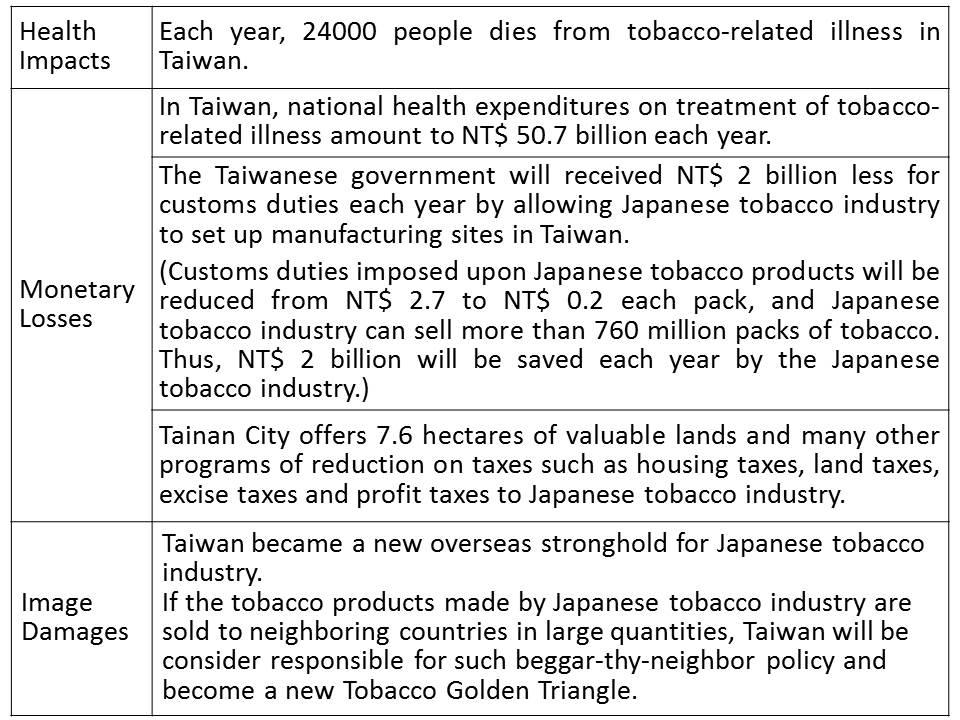Recent manuscripts
Archive
Editorial Board
Aims and Scope
Open Access
Indexing
Contact us
Authorship & COI
Principles of Transparency Checklist
Publication Ethics
Crossmark
Data Policies
Supporting Diversity
Instructions to authors (PDF)
Manuscript Types
Manuscript Formatting
How to submit
Special Publications & Reprints
Preprints
Strategies and impacts of Japanese tobacco industry in shutting down domestic factories and setting up production plants in Taiwan
1
John Tung Foundation, Taipei, Taiwan, China
Publication date: 2018-03-01
Tob. Induc. Dis. 2018;16(Suppl 1):A87
KEYWORDS
TOPICS
ABSTRACT
Background and challenges to implementation:
Since 2010, Japanese tobacco industry has shut down 4 tobacco factories and laid off 1600 staff workers in Japan. In order to reduce production costs, they have instead set up factories in Taiwan by promising the Taiwanese government that they would invest 300 million US dollars, create 300 more jobs, and sell all the tobacco products to other countries. The Ministry of Economic Affairs in Taiwan hence approved their investment plans, during which the Ministry of Health and Welfare did not render any opposition. The local government thereafter offered 7.6 hectares of lands for the Japanese tobacco industry to set up factories in 2015 and begin to sell low price cigarettes to youngsters at NT$ 50 per pack since 2017.
Intervention or response:
It is not only a blatant violation of Article 5.3 of the FCTC in allowing Japanese tobacco industry to set up manufacturing factories in Taiwan, but also a violation of Taiwan's Statute for Investment by Foreign Nationals. The Taiwanese government even used taxpayers' money to subsidize the tobacco industry, so much so that they could avert tariffs worth nearly NT$ 2 billion. What is even worse is that because of those subsidies, Japanese tobacco industry are able to sell tobacco products at a much lower price to our future generations, thereby also inspire many other international tobacco companies to follow suit.
Results and lessons learnt:
Damages caused by tobacco industries:

[Damages caused by tobacco industries]
Conclusions and key recommendations:
International tobacco companies´ aggressiveness is not a problem only for Taiwan. We hope all countries could closely collaborate with each other on this issue in preventing tobacco companies from expanding their killing fields.
Since 2010, Japanese tobacco industry has shut down 4 tobacco factories and laid off 1600 staff workers in Japan. In order to reduce production costs, they have instead set up factories in Taiwan by promising the Taiwanese government that they would invest 300 million US dollars, create 300 more jobs, and sell all the tobacco products to other countries. The Ministry of Economic Affairs in Taiwan hence approved their investment plans, during which the Ministry of Health and Welfare did not render any opposition. The local government thereafter offered 7.6 hectares of lands for the Japanese tobacco industry to set up factories in 2015 and begin to sell low price cigarettes to youngsters at NT$ 50 per pack since 2017.
Intervention or response:
It is not only a blatant violation of Article 5.3 of the FCTC in allowing Japanese tobacco industry to set up manufacturing factories in Taiwan, but also a violation of Taiwan's Statute for Investment by Foreign Nationals. The Taiwanese government even used taxpayers' money to subsidize the tobacco industry, so much so that they could avert tariffs worth nearly NT$ 2 billion. What is even worse is that because of those subsidies, Japanese tobacco industry are able to sell tobacco products at a much lower price to our future generations, thereby also inspire many other international tobacco companies to follow suit.
Results and lessons learnt:
Damages caused by tobacco industries:

[Damages caused by tobacco industries]
Conclusions and key recommendations:
International tobacco companies´ aggressiveness is not a problem only for Taiwan. We hope all countries could closely collaborate with each other on this issue in preventing tobacco companies from expanding their killing fields.
Share
RELATED ARTICLE
We process personal data collected when visiting the website. The function of obtaining information about users and their behavior is carried out by voluntarily entered information in forms and saving cookies in end devices. Data, including cookies, are used to provide services, improve the user experience and to analyze the traffic in accordance with the Privacy policy. Data are also collected and processed by Google Analytics tool (more).
You can change cookies settings in your browser. Restricted use of cookies in the browser configuration may affect some functionalities of the website.
You can change cookies settings in your browser. Restricted use of cookies in the browser configuration may affect some functionalities of the website.

